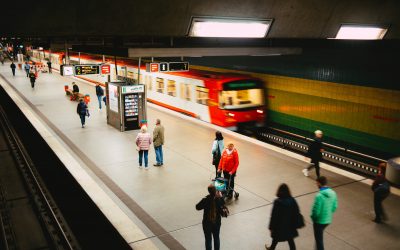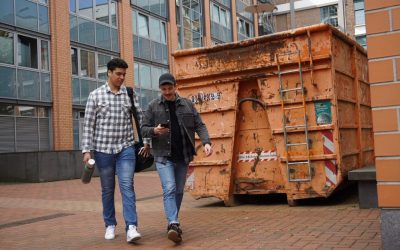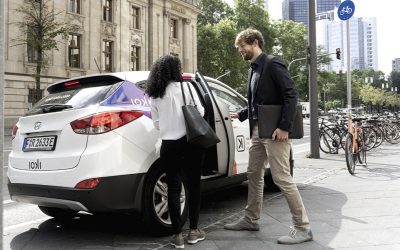Modern mobility in rural areas
Almost 16 million people live in rural regions throughout Germany. For them it is often a difficult task to get from A to B by public transport. After all, rural regions are at the back of the queue when it comes to expanding public transport. But why is the accessibility of these regions so poor and public transport hardly an alternative? How can it be guaranteed that people living in rural areas can also be mobile in a climate-friendly and cost-effective way?
Perspectives from Tijen Onaran
Tijen Onaran is the founder of the company Global Digital Women. Here, she is committed to the networking and visibility of women in the digital industry. In addition, Tijen advises companies on diversity issues, publishes articles in well-known media outlets such as Manager Magazine and moderates various events on topics of current interest to her.
Mobility between effectiveness and efficiency
Don’t worry, in this article we will not refresh the basics of business studies again. Rather, we would like to examine the extent to which the theory, which may already be somewhat dusty but is still valid and authoritative, can be combined with our daily practice, the transformation of public transport.
Perspectives from Silke Höhl
Silke Höhl is a PhD student at the Research Lab for Urban Transport (ReLUT) at the Frankfurt University of Applied Sciences. The construction and industrial engineer won the “Best Idea 2019” competition at the Allianz Pro Schiene Innovation Award 2019. Her concept: an innovative parcel delivery service. Hereby, the idea is not to create a new transport infrastructure, but to use public transport that is already well developed in the cities. The idea: underground and tramways take care of transporting the parcels to the city centres and a load wheel takes care of the last few kilometres to the front door.
With digital solutions towards profitable public transport
Mobility is often still a resource-intensive undertaking – in every respect: Too many cars on the road cause a high level of environmental pollution, loosely set timetables mean an immense loss of time and excessively large containers and empty runs – especially in rural areas and at off-peak times – take their financial toll.
Perspectives from Joachim Rodenkirch, Mayor of the city of Wittlich
Joachim Rodenkirch has been the mayor of the district town of Wittlich since 2009. A town with 20,000 inhabitants, which offers almost as many jobs, making Wittlich the economic powerhouse between Trier and Koblenz. Rodenkirch studied forestry, is a member of the district council and represents the interests of medium-sized towns on the board of the Rhineland-Palatinate Association of Towns and Cities. As mayor he has both witnessed and promoted many developments in the city. In 2018 the innovative project Wittlich Shuttle was launched.
Perspectives from Dr. Olga Nevska, Managing Director Telekom MobilitySolutions
Dr. Olga Nevska is Managing Director at Telekom MobilitySolutions. As a full-service provider and wholly owned subsidiary of Telekom, Telekom MobilitySolutions provides a comprehensive range of efficient, economical and sustainable mobility services tailored to customer needs. The portfolio ranges from classic fleet solutions with vehicles tailored to customer needs, including expansions, to employee mobility solutions.
With a doctorate in economics and law, she has been working for Deutsche Telekom AG in various positions since 2009: Controlling and Commercial both in Germany and internationally.
Employee mobility rethought
We are currently observing a greater change in the world of work than ever. While yesterday home office was an exception, today we work smoothly in virtual teams. At the same time, our approach to mobility is changing as well. In times of uncertainty, we need reliable and needs-based solutions that get us safely through (working) everyday life more than ever. This is a requirement that future-oriented employers have not only recently started to meet.
Mobility in Spain
Mobility is not only a prerequisite for economic growth, innovation and trade, but also for the personal well-being of people. It opens opportunities both for individual transport and for the community as a whole and is a global phenomenon with a local dimension. One mobility solution does not exist. In rural areas, for example, completely different mobility requirements can be identified compared to urban agglomerations. If we draw the line a little wider and look at mobility in an international comparison, it becomes clear that economic, cultural and geographical differences have a significant influence on our understanding of mobility.
Is commuting still up-to-date?
Most of us are familiar with it: The stress factor of commuting to work. Many people currently do without this trouble due to flexible home office solutions but un-der normal circumstances this is often the time-consuming and nerve-wracking part of the working day. Over 45 percent of employees commute to work every day.
More efficiency through on-demand transport
People are more often online and more connected than ever – many companies take advantage of this situation. In this context, the usage of data as a basis for decision-making is also increasing and there is a growing consideration for the individual concerns of each and every person: The focus on the consumer is growing steadily and thus becoming an important part when it comes to product design. Inevitabily, mobility service providers have to (and should want to) keep up with this trend.
Perspectives from Professor Stephan Rammler
Stephan Rammler is Professor of Transportation Design & Social Sciences at the University of Fine Arts in Braunschweig and since October 2018 Scientific Director of the IZT – Institute for Future Studies and Technology Assessment. He, is also the founder of the Institute for Transportation Design (ITD) with mobility and futurology as its focal points. He received the 2016 ZEIT Prize “Courage for Sustainability” for his work on environmentally friendly transportation, in the category Knowledge.
We spoke with Professor Rammler about researching the future, the concept of mobility in general, and current events and their significance for a possible new understanding of mobility.












